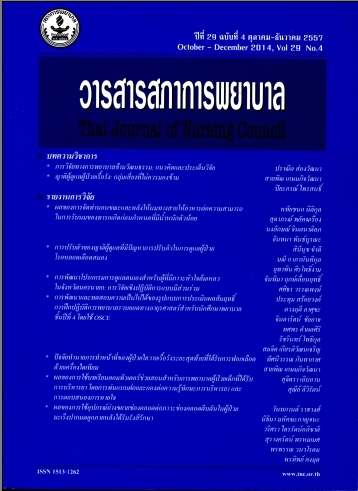ญาติผู้ดูแลผู้ป่วยเรื้อรัง: กลุ่มเสี่ยงที่ไม่ควรมองข้าม
Keywords:
ญาติผู้ดูแล ผู้ป่วยเรื้อรัง กลุ่มเสี่ยงต่อปัญหาสุขภาพ, adjustment, family caregivers’ adjustment problems, family caregivers for stroke patientsAbstract
บทคัดย่อ
ญาติผู้ดูแลที่ให้การดูแลผู้ป่วยเรื้อรังที่บ้าน จะได้รับผลกระทบด้านลบทั้งด้านร่างกาย จิตอารมณ์และสังคม ส่งผลให้ญาติผู้ดูแลประสบความเครียดเรื้อรังซึ่งจะส่งผลเสียต่อภาวะสุขภาพของญาติผู้ดูแลโดยตรง โดยเฉพาะญาติผู้ดูแลที่เป็นคู่สมรส มีปัญหาสุขภาพอยู่เดิมและเป็นผู้สูงอายุ กล่าวได้ว่าญาติผู้ดูแลเป็นกลุ่มเสี่ยงที่บุคลากรสุขภาพไม่ควรมองข้าม อย่างไรก็ตาม ระบบการให้บริการสุขภาพในปัจจุบันเน้นการเตรียมญาติผู้ดูแลเพื่อให้การดูแลผู้ป่วยเรื้อรังเป็นหลัก แต่มิได้คำนึงถึงสวัสดิภาพของญาติผู้ดูแล บทความนี้เป็นการเขียนเชิงวิเคราะห์จากงานวิจัยเพื่อสะท้อนให้เห็น ผลกระทบที่เกิดขึ้นกับญาติผู้ดูแล ความจำเป็นในการเตรียมความพร้อมของญาติผู้ดูแลแบบองค์รวมและครบวงจรเพื่อให้ญาติผู้ดูแลได้รับการดูแลและช่วยเหลืออย่างต่อเนื่องตั้งแต่ผู้ป่วยได้รับการรักษาในโรงพยาบาล เปลี่ยนผ่านจากโรงพยาบาลสู่บ้าน และความต่อเนื่องในการประสานการดูแลทั้งผู้ป่วยเรื้อรังและญาติผู้ดูแลเพื่อให้ญาติผู้ดูแลสามารถให้การดูแลผู้ป่วยเรื้อรังได้อย่างมีประสิทธิภาพ ขณะเดียวกันสามารถดูแลตนเองให้มีสุขภาพที่ดีได้ อันจะนำมาซึ่งคุณภาพชีวิตของผู้ป่วยเรื้อรัง
Objective:
To investigate adjustment problems faced b y stroke patients’ family caregivers.
Design:
Qualitative research.
Implementation:
The subjects were 10 purposively sampled family caregivers of stroke patients. The sampled caregivers were willing to participate in this study. Data were collected through an individual information questionnaire and 2 in-depth interviews. The two interviews and the field observation were tape-recorded. The recorded data were then transcribed and analysed using Content Analysis approach.
Results:
The study showed 6 major problems confronting relatives caring for stroke patients: reluctant acceptance, emotional outbursts, problems avoidance, avoidance of dependence on others, attempts to cope with their changed roles and responsibilities and physical adaptations.
Recommendations:
Nurses are supposed to be aware of the adjustment problems encountered by relatives who take care of stroke patients, in their varying contexts. The information obtained from this study could be used for the purpose of planning or preparing family caregivers before the patients are discharged. More importantly, regular follow-ups on the family caregivers are recommended so that their caregiving performance can be monitored and proper advice can be duly provided.







